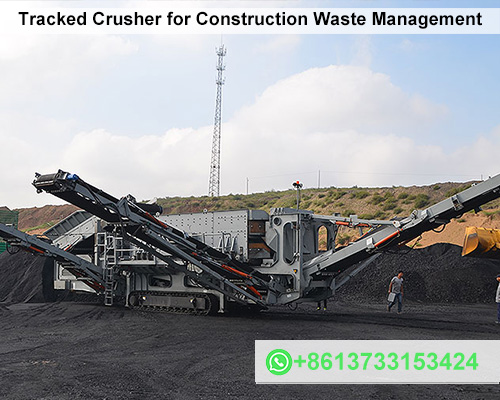Tracked Mobile Crushing Plant for Construction Waste Management
- On-Site Processing
- Eliminates the need to transport waste to off-site facilities, reducing fuel costs and carbon emissions.
- Versatility
- Crushes diverse materials: concrete, asphalt, bricks, and rocks.
- Cost Savings
- Recycles waste into valuable aggregates for reuse in new projects, lowering material procurement costs.
- Environmental Compliance
- Supports circular economy goals by minimizing landfill use and adhering to strict waste regulations.
- Advanced Mobility
- Equipped with rugged tracks for stable operation on uneven terrain (e.g., demolition sites).
- High Crushing Capacity
- Processes 100–500 tons of waste per hour, depending on model size.
- Smart Automation
- Remote monitoring and adjustable settings optimize output size (e.g., 0–40 mm for base layers).
- Durability
- Reinforced steel components withstand abrasive materials and harsh conditions.
- Demolition Sites
- Crushes concrete slabs and rebar into recycled aggregates for new foundations.
- Road Reconstruction
- Repurposes old asphalt into sub-base materials for road repairs.
- Urban Development
- Clears construction debris in tight spaces (e.g., city centers) without disrupting traffic.
- Disaster Recovery
- Rapid deployment to process rubble after natural disasters.
- Material Type and Hardness
- Opt for Liming Heavy Industry’s jaw crusher for hard concrete or impact crusher for mixed debris.
- Output Requirements
- Match crusher settings to desired aggregate size (e.g., fine vs. coarse).
- Fuel Efficiency
- Hybrid or electric models reduce operating costs and emissions.
- Brand Reputation
- Liming Heavy Industry offers reliable equipment backed by comprehensive after-sales support, spare parts availability, and decades of expertise in crushing-screening technology.
- Pre-Sorting Waste: Remove contaminants (e.g., plastic, wood) before crushing.
- Regular Maintenance: Inspect tracks, hydraulics, and wear parts (e.g., blow bars) to prevent downtime.
- Dust Suppression: Use Liming’s integrated water sprays or misting systems to comply with air quality standards.
- Operator Training: Ensure teams understand safety protocols and machine controls.
- AI-Powered Sorting: Integration with AI systems to enhance material separation.
- Battery-Powered Crusher: Emission-free models for urban projects.
- Modular Designs: Scalable plants tailored to project-specific needs.
Introduction to Tracked Mobile Crushing Plants
Construction waste, including concrete, bricks, and asphalt, accounts for a significant portion of global landfill waste. Liming Heavy Industry’s tracked mobile crushing plants offer a sustainable solution by processing debris directly on-site, transforming it into reusable materials like aggregates. These self-propelled machines combine mobility with high efficiency, making them indispensable for modern construction and demolition projects.

Why Use Liming Heavy Industry’s Tracked Mobile Crushing Plants for Construction Waste?
Key Features of Liming Heavy Industry’s Tracked Mobile Crushing Plants
Applications in Construction Waste Management
How to Choose the Right Tracked Mobile Crusher
Best Practices for Efficient Waste Recycling
Case Study: Reducing Costs in a High-Rise Demolition Project
A construction firm in Germany used Liming Heavy Industry’s LT106 tracked jaw crusher to process 10,000 tons of concrete waste on-site. The recycled aggregates were reused for road bases, saving €150,000 in disposal fees and new material costs.
Future Trends in Construction Waste Recycling
Conclusion
Liming Heavy Industry’s tracked mobile crushing plants are game-changers for sustainable construction waste management. By enabling on-site recycling, reducing costs, and supporting environmental goals, these machines empower businesses to turn waste into valuable resources. With decades of experience in mining and aggregate equipment manufacturing, Liming Heavy Industry ensures long-term efficiency and compliance with green building standards.

